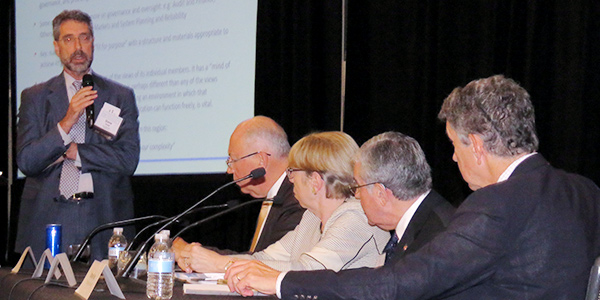By Rich Heidorn Jr.
WASHINGTON — Day Pitney attorney David Doot had a list of questions to ask the present and former RTO board members on a panel he moderated at the Energy Bar Association’s annual meeting May 6. But the alpha dog board members quickly seized control, asking each other questions rather than wait for prompting.
Former PJM Chair Howard Schneider started, asking his fellow panelists, “Are boards policymakers?”
Barney Rush, a member of ISO-NE’s board, said he saw the board’s role as akin to the “town crier” in identifying problems.
“We’re listeners,” said MISO Director Barbara J. Krumsiek, former CEO of Calvert Investments. “We have to be very careful and diligent listeners.”
Former MISO Chair Michael Curran, now on the ISO-NE board, jumped in with his own question, asking whether boards serve as “thought leaders.”
“More often than not, we’re reactive to stakeholder problems,” responded Rush. He recounted the discussions the board, the New England Power Pool, the New England Conference of Public Utilities Commissioners and New England States Committee on Electricity had in 2017 on whether to implement a carbon tax in the region. (See ISO-NE Effort to Accommodate States Leaves them Alienated.)
“Once it became a nonstarter to the states, we dropped it,” he said.
Krumsiek, a mathematician and former Pepco Holdings Inc. director, said the board has an important role in strategy development. “The energy sector as we all know is undergoing the most significant disruption and innovation in its history and arguably the most significant disruption and innovation of among all industries,” she said.
As a result, MISO’s board meets twice annually. “I’ve never been on a board that’s met twice a year for strategy,” she said. “But our industry demands it.”
MISO also has created a standing technology committee to address cybersecurity and ensure its market systems evolve to handle new products, she said. “The urgency of this is clear. All the disruption we’re talking about is often technology-solved and technology-driven.”
Doot, who serves as secretary to NEPOOL, ISO-NE’s stakeholder body, eventually got to ask more of his questions, querying the panel on board turnover and other matters.
Providing Oversight Without Being Overbearing
Discussing the need for board members to provide active oversight without meddling in day-to-day operations, Krumsiek said she follows the advice she received from Curran when he was on the MISO board: “Noses in, fingers out.”
Rush said the ISO-NE board asks two questions when management comes to it with a proposal. “One question is, ‘What is the actual substance of the issue you’re asking us to think about and what are you asking us to respond to?’ The other that’s always in our minds is, ‘Are we comfortable with the process that you undertook to come to that recommendation to us?’ Do we feel that you have undertaken the appropriate review, ventilation, thoughtfulness, consultation with everybody?”
Licensing for FTR Traders?
When Doot opened questions to the audience, Direct Energy’s Marji Philips cited the GreenHat Energy default in PJM’s financial transmission rights market, asking when boards should “push back” on their executives. (See Report: ‘Naive’ PJM Underestimated GreenHat Risks.)
Schneider responded first but said he could not comment on the default, noting “I was out of [PJM] by the time it blew up.”
Curran, who also serves on the NASDAQ board of directors, said the incident highlighted the need for licensing of traders to “take these bad players out of the market.” GreenHat’s two principals had come to FERC’s attention earlier for their roles in J.P. Morgan Ventures Energy Corp.’s scheme to manipulate the CAISO and MISO markets between 2010 and 2012.
“You misbehave, we’ll pull your license,” Curran said. “It’s being performed at other organizations. Why wouldn’t we consider it?”
Krumsiek said she also favored licensing of traders in RTO markets. GreenHat “would not happen in most financial markets,” she said, adding, “To have expected RTO markets to have reached maturity in 20 years is probably [unrealistic].”
Board Independence and the Role of the States
Schneider, who was part of PJM’s first Board of Managers in 1997, recalled that when the board was formed, one sector, which he did not name, sought veto power on issues the board could consider. The board refused to sit unless the veto power was eliminated, he said. “And that spark of independence has remained throughout,” said Schneider, a senior consultant at Charles River Associates.
Schneider called the states “key policy players in the RTO paradigm.”
“And while an RTO is quasi-governmental in a sense, the states — for whatever reason — initially chose not to become members of PJM. In retrospect, I think that was a mistake,” he said.
Acknowledging there are pros and cons to state participation, Schneider continued, “The pros to me are they get in on an issue earlier. They think about the issue, and they have some [clout] as a member that they don’t have as a non-member.
“The states that we represent are not a monolith. The states have different views and they need to come across with their views in the context of a stakeholder meeting.”
“I think [on] that last point, you may have some disagreements up here and in the audience,” Doot said.
“It wouldn’t be an Energy Bar Association [meeting] if there weren’t disagreement,” joked Schneider, the only lawyer among the panelists.
“Fair point,” responded Doot.




